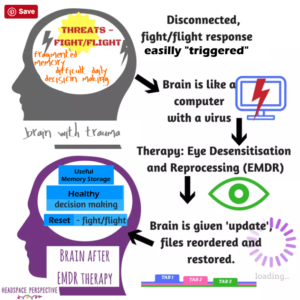In a nutshell, unresolved trauma and prolonged toxic stress cause brain damage.
The amygdala (the part of your brain that deals with emergencies) can become very sensitive and can be “switched on” by the slightest pressure (a hair-trigger).
The connection with the hippocampus (that deals with storage of life events) is also affected, causing these unresolved memories to be stored as mixed-up fragments (negative thoughts, emotions, body sensations, etc.).
That is why when a sufferer is presented with a trigger (something happening today that your brain links to the unresolved memories), trauma reactions (emotional overwhelm, anxiety, PTSD symptoms, depression, addiction, etc.) can happen.
EMDR Therapy seeks to reprocess and shift the storage of unresolved traumatic memories (allow your mind to sort through them, discard what is not helpful, and keep what is useful), so beneficial brain functioning can be restored (appropriate fight/flight reactions and healthy decision making).
EMDR Therapy is kind of like “updating” the programming of a computer.

